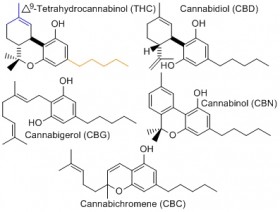 Recent preclinical studies published over the past several weeks provide further evidence that cannabinoids are both neuroprotective and cardioprotective.
Recent preclinical studies published over the past several weeks provide further evidence that cannabinoids are both neuroprotective and cardioprotective.
A May 30th blog post on the website Science20.com sums up new findings from Israel regarding the ability of low doses of THC to prevent brain damage in animals.
Prof. Yosef Sarne in the Department of Physiology and Pharmacology at Tel Aviv University says that [cannabis] … has neuroprotective qualities. He has found that extremely low doses of THC — the psychoactive component of marijuana — protects the brain from long-term cognitive damage in the wake of injury from hypoxia (lack of oxygen), seizures, or toxic drugs.
Previous studies focused on injecting high doses of THC within a very short time frame – approximately 30 minutes – before or after injury. Sarne’s papers in Behavioural Brain Research and Experimental Brain Research say that even extremely low doses of THC – around 1,000 to 10,000 times less than that in a conventional marijuana cigarette – administered over a wide window of 1 to 7 days before or 1 to 3 days after injury can jump-start biochemical processes which protect brain cells and preserve cognitive function over time.
… In the lab, the researchers injected mice with a single low dose of THC either before or after exposing them to brain trauma. A control group of mice sustained brain injury but did not receive the THC treatment. When the mice were examined 3 to 7 weeks after initial injury, recipients of the THC treatment performed better in behavioral tests measuring learning and memory. Additionally, biochemical studies showed heightened amounts of neuroprotective chemicals in the treatment group compared to the control group.
… This treatment, especially in light of the long time frame for administration and the low dosage, could be applicable to many cases of brain injury and be safer over time, Sarne says.
NORML has previously reported on separate preclinical data documenting that cannabinoids can promote neurogenesis (the active production of new neurons) in laboratory animals as well observational data indicating that marijuana may provide neuroprotection against alcohol-induced impairment in adolescent subjects.
In addition, recently published preclinical studies also indicate that cannabinoids may offer benefits to the heart. Animal data published in the June issue of the scientific journal Biochemical Pharmacologyreports that THC administration “is a safe and effective treatment that reduces myocardial ischemic (heart attack) damage.” Authors concluded: “[O]ur study provides novel evidence for the beneficial use of extremely low doses of THC, doses that do not elicit any psychoactive side effects, in order to protect the heart from ischemic insults. THC can be used as a pre-conditioning drug in cases in which ischemic insult to the heart is anticipated, such as during cardiac surgery or percutaneous coronary intervention. If post-conditioning with THC will be found effective, it could also be used following myocardial infarction.”
The results of a separate preclinical trial, published in May in the journal Environmental Toxicology and Pharmacology, report that the administration of the non-psychotropic cannabinoid cannabidiol (CBD) is protective against cardiotoxicity in rats. “[C]annabidiol ameliorated doxorubicin-induced cardiac injury,” the study concluded. “These results indicate that cannabidiol represents a potential protective agent.”
In February of this year, investigators at the Bar-Ilan University in Israel also reported that the administration of delta-9-THC protects heart muscle cells from injury during hypoxia (a deficiency in the levels of oxygen in the blood). THC “delaying the onset of irreversible cell injury … on hypoxia-exposed cardiac cells in culture,” authors found. They concluded, “This research demonstrates that THC has beneficial effects on cardiac cells and supports the consideration of marijuana for specific medical uses.”
Article republished from NORML









